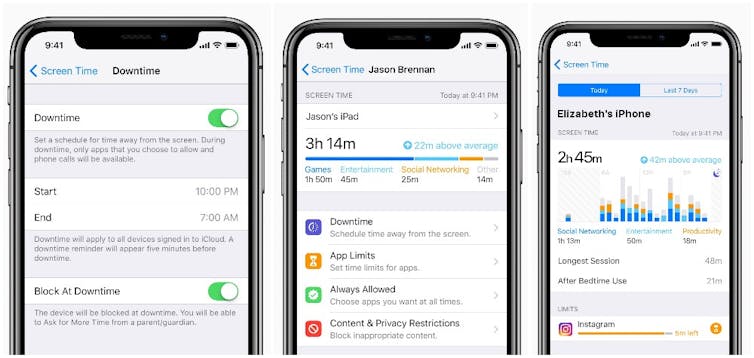Apple acknowledges the iKid generation at its developer conference with new parental controls
- Written by Michael Cowling, Senior Lecturer in Educational Technology, CQUniversity Australia
Apple’s Worldwide Developer Conference (WWDC) kicked off this week. While new iPhones were nowhere to be found – Apple CEO Tim Cook started the event by letting us know it was “all about software” – the company did preview some interesting changes to their iPhone and iPad operating system. They’ve added new apps, advanced augmented reality features and performance improvements.
But perhaps one of the most interesting new features for parents and educators was the dual admission that while coding and creativity is important, a balance for kids is also something that Apple values. This is perhaps best exemplified by the addition of a new set of parental controls that allow parents and teachers to limit time in certain apps and set restrictions on iDevice usage for kids.
With these changes available in iOS 12 – due for release in September – it feels like Apple is finally acknowledging the new type of digital native they’ve created, and taking earlier steps to make sure their technology is used responsibly.
Read more: Devices in schools and at home means too much screen time for kids
The rise of the iKid
American writer Marc Prensky famously defined a new concept at the turn of the 21st century. In 2001, he published a paper pegging this new generation as “digital natives” – kids that never knew a world without computers. In contrast to “digital immigrants” – people brought up before the widespread use of digital technology – Prensky claimed that these children would be more familiar with technology, able to pick up concepts quickly and work seamlessly with tech because that’s all they ever knew.
While the concept of digital natives has been debated (and somewhat debunked) over the last 17 years, perhaps it’s time for a new classification recognising that the world changed significantly in 2007 when the iPhone was released.
Both authors are educators and have children that were born after this date. Not only do our children not know a world without computers, they also have no concept of a world without smartphones, always-on internet, and the benefits it brings.
Read more: Don't use technology as a bargaining chip with your kids
In fact, a 2016 survey of more than 18,000 Australian children found that 56% of the young people surveyed spent more than two hours a day using technology outside of school hours. One in ten children spent over four hours on their devices outside of school hours, with boys averaging 4.2 hours and girls averaging 3.7 hours, and one in four young people surveyed also said they would find it impossible to give up technology for one week. It’s clear that young people love their technology.
These kids expect every single screen to be a touch screen, take for granted on-demand access to music and television, and have a (perhaps unhealthy) obsession with social media and independent content through Youtube and Twitch. They transcend the digital native label, becoming true children and learners of the smartphone age – the proverbial iKids of our generation.
In their “what’s a computer?” ad – showing a young girl using an iPad Pro for various tasks before acknowledging that she didn’t know what a computer was – Apple explicitly noted that this new type of iKid exists and that it thinks they are the future.
And this week at WWDC, they appeared to acknowledge some responsibility for creating balance in their lives.
If the iPad is going to parent anyway, why not give it morals?
Which brings us back to the new Apple parental controls. In an event focussed on well-being and balance in the use of our iDevices, Apple made particular mention of allowing parents to keep an eye on their kids usage.
Parental controls can be activated through Family Sharing. They allow parents to put limits on their kids usage of individual apps, while allowing unlimited use of education apps. The device will remind users when they’ve been using an app too long – or only have five minutes of allowance left. It will also provide reports of how long is spent in each app, and a weekly summary of app usage.
 Apple’s new Screen Time features.
Apple
Apple’s new Screen Time features.
Apple
Combined with new features like “Do Not Disturb at Bedtime” and customisable notifications, these controls indicate a focus on healthy device usage by Apple. Mirroring some of the announcements by Google earlier this year, this indicates that Apple knows how much we all use our devices, but wants to ensure that we use the devices to enhance our lives, and not take away from them. In particular, this would seem to be a really important factor for this new generation of iKids.
Read more: Electronic games: how much is too much for kids?
The digital native nomenclature might have been debunked, but it would appear that announcements by Apple and Google indicate a new paradigm is coming. And as the second-generation digital native arrives – the iKid – it looks like Silicon Valley for once might be considering how to help them live a balanced life.
Or perhaps it’s just another way to gather data and analytics for the Silicon Valley juggernaut. Here’s hoping it’s the former.
Authors: Michael Cowling, Senior Lecturer in Educational Technology, CQUniversity Australia





